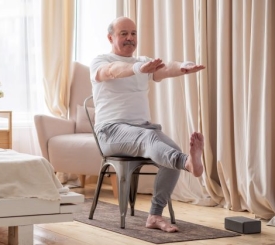Integrative Medicine: Why did I incorporate yoga into my clinical practice?
Posted on April 18, 2022 |
This article was written by Stephanie Williams, BS, RRT.

This month on COPD360Social, we discussed integrative medicine as an additional tool for the management of COPD. I had the opportunity to interview a former colleague of mine who has recently incorporated yoga into her work as a licensed counselor. While counseling and therapy by themselves can be very helpful to people living with chronic illness, there can be added benefit by including other types of complementary therapies, such as yoga.
I connected with April Hibdon, LCSW, and asked her several questions about yoga and integrative medicine. She said she was happy to share this information with health care professionals because she believes that this type of “breath work” could be helpful to those living with COPD and other lung conditions. She says the practice of yoga can be of particular help to people experiencing anxiety. April was generous with her time and answered the following questions:
Q: Can you tell me what kind of practice you are in? Individual counseling? Families?
A: I am a Licensed Clinical Social Worker. My practice is with individuals ages 16 and up. Currently, I see clients via telehealth as it is providing opportunities for those with busy schedules and in rural areas to seek care.
How did you learn about incorporating yoga into your work?
A: I have been interested in yoga for years because it is calming and relaxing. Actually, my chiropractor recommended it to me for my lower back pain. Yoga allows me to be more centered and connected. Several years ago, I became aware of therapists that were using it in their practice to help clients that have anxiety and histories of trauma.
Q: What did you have to do in order to provide that kind of treatment to your patients?
A: In order to provide yoga-informed care to clients, the provider has to complete the necessary training. There are many programs available; however, I chose to participate in the Yoga Fit program. I started with a level one training that teaches the basics, and I added different classes until I met all the requirements.
Q: Has adding the practice of yoga been helpful for you?
A: Yes, as I have clients specifically interested in this type of practice. I often use the breath work to help clients when they become anxious and/or overstimulated.
Q: How has it been beneficial to your patients?
A: As a therapist, I am always looking for ways to assist my clients to get better connected to themselves and their feelings, because with trauma, we often don't have words to express ourselves. As Dr. Bessel Van Der Kolk states in his book, The Body Keeps the Score: “Trauma makes you feel as if you are stuck forever in a helpless state of horror”. However, with a practice like yoga, "...it opens up new perspectives on how actions that involve noticing and befriending the sensations in our bodies can produce profound changes in both mind and brain that can lead to healing from trauma. People who feel safe in their bodies can begin to translate the memories that previously overwhelmed them into language."
Q: Was it received well by your patients? Or was there any reluctance or resistance to it?
A: Not all clients are open to this type of body work. Relaxation alone can make some people very uncomfortable. It takes a level of trust and stepping outside of your comfort zone because it does feel different than what we are accustomed to. We tend to like “staying in our heads” vs “in our bodies”. I usually start with guided meditations/relaxations in order to get clients used to the process of being aware of their breath and how to recognize where in their bodies they hold their feelings, anxieties, and traumas.
Q: What would you want to tell someone who is interested in using yoga or other integrative medicine into their health care plan?
A: Go in with an open mind. It can feel uncomfortable at first and we are often self-conscious. We historically “stuff our feelings” because we think it makes us weak to express them; however, if we don't process our feelings, they find a way out. It may be through headaches, back pain, addictions, numerous health conditions, etc. But it will find a way out. There are so many options available. Seek which one works best for you and your lifestyle. If you consider how we come into this world at birth, (we use our instincts/feelings/basic needs) thoughts come later. Integrative medicine like yoga, meditation, massage, etc. helps us get back to sensations like we did before we had words.
Q: Would you have advice for a health care professional who is interested in using yoga or other complementary medicine into practice for their patients?
A: Try different modalities. Discover what speaks to them and research programs that fit their needs. The program that I chose allows me to complete the courses in steps for full certification; however, I am able to use what I learn and practice as I complete each course.
The COPD Foundation thanks April for sharing her experiences with yoga and other integrative medicine practices. These therapies can be used in tandem with other COPD management tools to help holistically treat individuals with COPD. While some patients may be hesitant to try integrative medicine, others may find a significant benefit to adding these interventions to their treatment regimen.